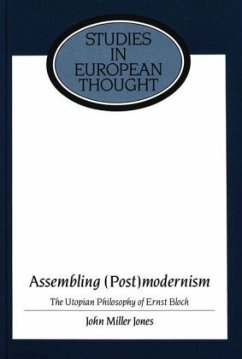Assembling traces of hope and human striving, the philosophy of Ernst Bloch (1885-1977) offers an interpretation of the meaning of utopia. This examination relates Bloch's work to the post-modern theory of Lyotard, Derrida, and Foucault and explores its roots in the paradigm of modernism as developed by Kant, Hegel, Marx, Freud, and Heidegger. Providing a comprehensive view of Bloch's life and work, this study also treats a wide variety of themes in the traditions of European philosophy and culture and should be of interest to scholars in all of the humanistic disciplines.

